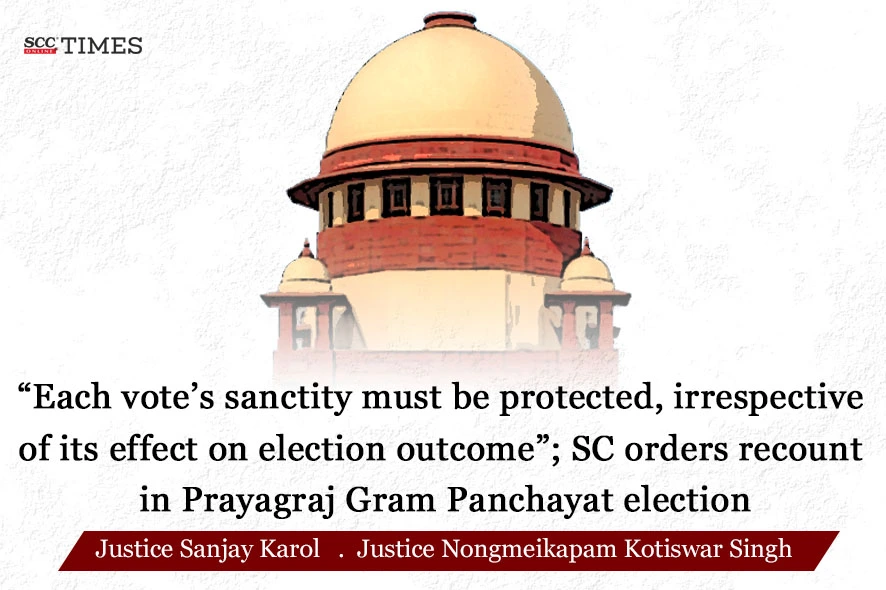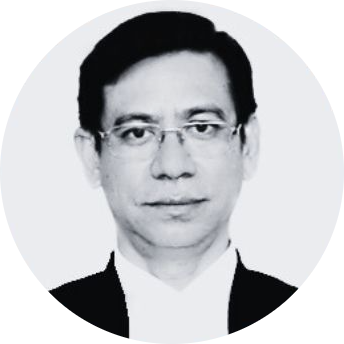Supreme Court: In a matter concerning the fairness of the election process for the Gram panchayat election and the recount of votes, the division bench of Sanjay Karol* and Nongmeikapam Kotiswar Singh, JJ. having considered the circumstances and the issues surrounding the election process, set aside the judgment passed by the High Court, and restored the order passed by the Sub-Divisional Magistrate, which had directed a recount of the votes.
Background
The Government of the State of Uttar Pradesh declared election for the position of ‘Gram Pradhan’ for the village Chaka, Saidabad, Tehsil Handia, in the District of Prayagraj, vide notification dated 17-03-2021. Voting therefore was to take place on 2-05-2021 and 3-05-2021. The genesis of the appellant’s discontent was the inconsistency between the Presiding Officer’s statement to him that in polling booths 43, 44 and 45 a total of 1194 votes were cast, and the final tally given under ‘Form 46’ which showed a total of 1213 votes cast in the said booths.
Aggrieved by the discrepancy in the vote count and the result, which placed Pradhan’s seat 37 votes beyond the appellant’s reach, and suspecting foul play, the appellant raised a serious concern regarding the cancellation of votes cast in his favour. He alleged that such cancellations were carried out by the persons deputed at the Nyay Panchayat, in collusion with respondent 1. In light of this, the appellant formally requested the Election Officer to conduct a recount of the votes in booths Nos. 43, 44, and 45. However, the Election Officer did not entertain this request. Consequently, the appellant filed an Election Petition. The Sub-Divisional Magistrate, after reviewing the evidence, passed an order granting the appellant’s prayer for a recount of the votes. Respondent 1, dissatisfied with this order, filed a revision, which was subsequently dismissed. Following this, respondent 1 approached the High Court by filing a writ petition, which resulted in the impugned judgment, wherein the said direction was set aside by the High Court.
Issue
Whether the Sub-Divisional Magistrate was justified in ordering a recount of the votes cast?
Analysis and Decision
The Court took note of U.P. Panchayat Raj Act, 1947, wherein under Section 12 provides for the constitution of Gram Panchayats, the manner of election thereto, allowances of the elected members, superintendence of the elections, taking of vehicles and premises for the purpose of elections, procedure to question the elections, etc. The Court further examined Section 12-C which concerns the filing of applications questioning the elections.
Examining the law around recounting of votes, the Court took note of Ram Sewak Yadav v. Hussain Kamil Kidwai, 1964 SCC OnLine SC 249, wherein it was observed that an order for inspection of ballot papers is not to be made as a matter of course and it is only upon the fulfillment of certain conditions that the same can be permitted.
Considering the prayer for recount which has been allowed by the Sub-Divisional Magistrate, the Court remarked that “the Court’s concern lies away from who is in power and instead is in how one got to power. This process has to be in accordance with constitutional principles and established norms – if not, then such a person has to be deprived of the power, and the decision-making by the people must begin once more”.
The Court emphasised that “each vote has its own value irrespective of its effect in the outcome of the election. Its sanctity has to be protected”.
The Court observed that the election in question was a four-sided contest, with four candidates vying for the position of ‘Pradhan.’ Notably, three out of the four candidates submitted affidavits expressing doubts about the fairness of the election process and indicated their support for a recount of the votes. The Court further highlighted that deliberate efforts appeared to have been made to favor the eventual winner, including the use of police force to remove the appellant from the polling area.
Moreover, the diary of the Presiding Officer, an essential document that records the casting of votes, was conspicuously absent despite diligent efforts to locate it. This raised serious concerns about the integrity of the election process. The Court emphasized that candidates in an election are entitled to monitor the voting process and inspect the records, and any attempt to obstruct this right is unjustifiable. In light of the missing Presiding Officer’s records, the Court concluded that the final election results were open to legitimate question. The Court further stressed that every document related to an election is crucial and must be preserved to ensure transparency and fairness in the electoral process.
The Court noted that the election in question occurred in 2021, and the legal process has taken four years to culminate in this judgment. The Court pointed out that three out of the four candidates had raised concerns about the veracity of the election and the manner in which it was conducted. Additionally, the absence of crucial election documents, including the Presiding Officer’s diary, remained unexplained. Given these circumstances, the Court concluded that the doubts raised regarding the election’s integrity, coupled with the unexplained missing documents, justified the need for a recount. In the present facts, the Court held that a recount would be appropriate to ensure fairness and transparency in the electoral process.
Hence, the Court set aside the judgment passed by the High Court, and restored the order passed by the Sub-Divisional Magistrate, which had directed a recount of the votes.
The Court further directed the Registry to send a copy of this judgment to the Registrar General of the High Court. The Registrar General was instructed to ensure that the judgment is communicated to the Magistrate concerned, who shall then schedule a date for the recount of votes after hearing the parties involved.
CASE DETAILS
|
Citation: Appellants : Respondents : |
Advocates who appeared in this case For Petitioner(s): For Respondent(s): |
CORAM :








